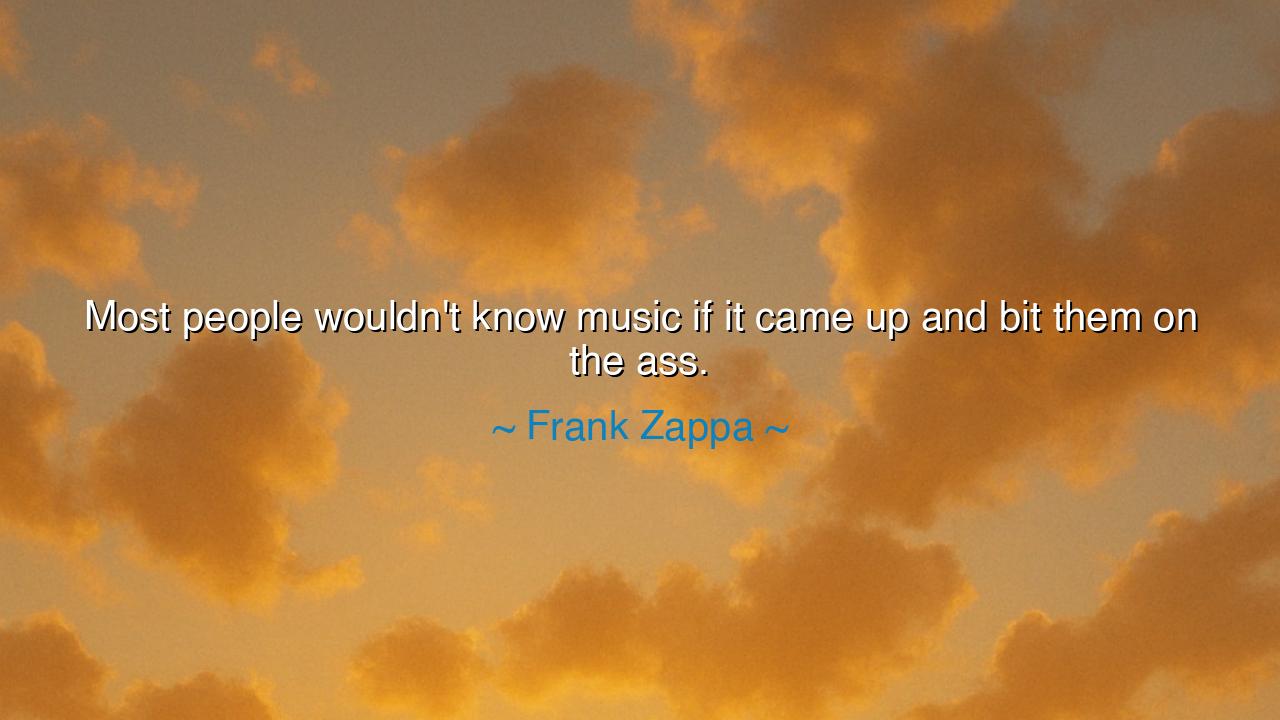
Most people wouldn't know music if it came up and bit them on






The maverick philosopher of sound, Frank Zappa, once hurled a truth into the world with his sharp wit and fearless tongue: “Most people wouldn’t know music if it came up and bit them on the ass.” At first hearing, these words sting with humor and irreverence. Yet beneath their rough skin lies a truth as ancient as art itself—that many hear but do not listen, many consume but do not understand, and many mistake noise for the living flame of music. Zappa’s voice, though biting, was the cry of one who loved music too deeply to see it treated lightly.
To say that most do not recognize music is not to insult their ears, but to lament their inattention. For true music is not simply sound organized into melody and rhythm. True music is spirit clothed in vibration, an encounter with the invisible architecture of emotion, mathematics, and truth. Those who pass it by as mere entertainment fail to see its divine power. They are like wanderers in a temple who admire the stones but never lift their eyes to behold the light streaming through the stained glass.
Zappa himself was no ordinary musician. He fused rock, jazz, classical, satire, and chaos into works that defied categories. He lived to challenge the complacent ear, to shock the audience awake, to demand that people not only hear, but listen. When he mocked the masses in this quote, it was not cruelty, but urgency. He was saying: awaken yourselves! Do not let the sacred force of music pass through you unnoticed, for it can transform, enlighten, and stir revolutions of the heart—if only you have the ears to hear.
History offers us an echo of this lament. In the time of Ludwig van Beethoven, many mocked his later works as strange, dissonant, or even mad. They could not recognize the genius shaping a new world of sound. They did not know music when it bit them. Yet today, those very works are revered as the foundations of modern symphonic art. The people laughed; time revealed their blindness. Zappa’s words, then, are not just about his own age—they are a warning across the centuries: to dismiss what we do not understand is to miss the revelations of the future.
This truth applies not only to music, but to life itself. Many fail to recognize the art in everyday experience—the poetry in a sunrise, the rhythm in footsteps, the melody in a voice. They live deaf to the song of existence, mistaking the miraculous for the mundane. Zappa’s biting words remind us that blindness to beauty is a tragedy greater than ignorance. For to live without recognizing art is to live half-alive, untouched by the depth that gives meaning to the world.
The lesson is therefore this: train your ears and your heart. Do not settle for shallow listening. Seek out not only what is pleasing, but what challenges you, expands you, unsettles you. Embrace the unfamiliar, for within it may be a new world of truth. When you hear music—whether in a symphony, a song, or the rhythm of rain—ask not only “Do I like this?” but “What does this reveal? What does it awaken in me?” In such listening, you become more than a consumer—you become a participant in art itself.
Practically, this means: give time to music you do not understand. Sit with it, let it wash over you, wrestle with it. Learn to hear beyond the surface. Study the greats, old and new, and notice how their works connect across time. And above all, carry the spirit of listening into your life. Hear the people around you, not just their words but their unspoken songs. Hear the music in the world, for it is always playing.
So let Zappa’s sharp truth endure: do not be one who cannot recognize music when it bites. Do not be deaf to beauty, blind to art, numb to the sacred rhythms that flow through life. Open your ears, open your heart, and awaken to the deeper music that surrounds you always. For in that awakening lies not only the joy of art, but the fullness of being human.






AAdministratorAdministrator
Welcome, honored guests. Please leave a comment, we will respond soon